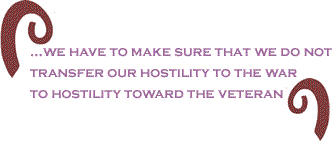
|
|||||||||||||||||||||
 |
|||||||||||||||||||||
|
||||||||||
 |
||||||||||
|
||||||||||
The current issue is always free to everyone If
you need the access available to a |
||||||||||
 |
||||||||||
The report this past week confirmed what veterans’ advocates have been saying for some time: one quarter of the homeless are veterans! While this came as a shock to many people, anyone of age at the time of the Vietnam War would not have been surprised at all. In the 1960s and 1970s we saw returning veterans discarded by the government that had placed them in harm’s way. Many returned strung out on heroin and were completely unable to adjust to life at home. As homelessness became a national phenomenon in the 1980s, we often saw the face of the Vietnam War veteran staring back at us on the streets of the USA. Yet few of us stop and realize that the mistreatment of veterans is not just peculiar to Iraq or Vietnam. After each major military conflict, with the possible exception of World War II, soldiers who were drafted or enlisted in the context of a patriotic fervor, returned home to a society that rarely knew what to do with them and, sometimes depending on the nature of the conflict, found them to be an embarrassment. The years following World War I are an example of this. Veterans, including a great uncle of mine, returned from the war scarred for life physically and/or psychologically, yet the government was unwilling to step forward and assist them in achieving any degree of normalcy. This recurring situation is what infuriated me in the lead up to the illegal and immoral US invasion of Iraq. At the same time that the Bush administration was fanning the flames of war hysteria with misinformation, half-truths, fear and calls to patriotism, it was simultaneously cutting back on funds for the Department of Veterans Affairs. At a moment when soldiers needed assurance of US government support, should they return injured or otherwise facing adjustment issues (including needing assistance in finding housing, jobs and psychological/emotional counseling), the Bush administration was quietly cutting back; some would say, cutting the soon-to-be veterans adrift. I have found myself wondering each time the US — and especially the Bush administration — beats the drums of war, why and how we so easily forget this history, and particularly the disposability of the citizen soldiers after they have served the objectives of whomever happened to have been in power. Given the racist reality of the USA, it should come as no surprise that the crisis of the veteran becomes the catastrophe for Black and Latino veterans. I saw this after Vietnam and I am seeing it again with Iraq. But even in Black America, there are few voices speaking up for the veteran. Perhaps we simply think that the issues they face are just another variant of those which we all suffer. While there is a truth to this, such a view is nevertheless unacceptable. Particularly in an environment of dramatic Black opposition to the US aggression against Iraq, we have to make sure that we do not transfer our hostility to the war to hostility toward the veteran.
This totality necessitates a Black veterans’ movement that reaches out to other Black veterans, provides a leading voice against the war and all future plans of aggression and also becomes a means to help our community focus our collective opposition to the war. It necessitates as well as advances the demand that the government take care of those it was willing to sacrifice for a lie. Let’s hear the voice of the Black veteran! BlackCommentator.com
Editorial Board member, Bill Fletcher, Jr. is a labor and international
writer and activist, a Senior Scholar with the Institute for
Policy Studies and the immediate past president of TransAfrica
Forum. Click
here to contact Mr. Fletcher. |
||||||||||
| November
15 , 2007 Issue 253 |
|
| Printer Friendly Version in resizeable plain text format format |
 |
 |
 |
| |
| |






























